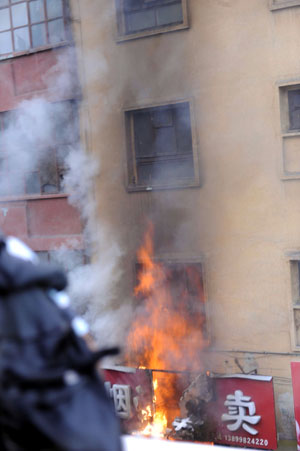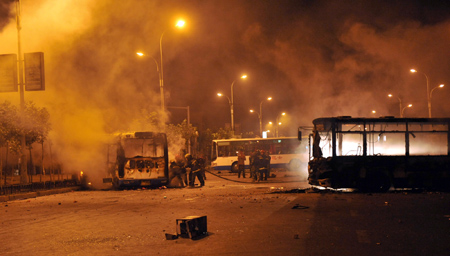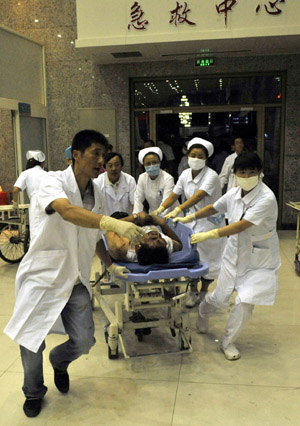|
 |
|
Photo taken on July 5, 2009 shows a shop being burned in a street of Urumqi, capital of northwest China's Xinjiang Uygur Autonomous Region (XINHUA) |
The violence in Urumqi, capital of northwest China's Xinjiang Uygur Autonomous Region, has left 140 people dead, the regional public security department said Monday.
Fifty-seven dead bodies were retrieved from Urumqi's streets and lanes, while all the others were confirmed dead at hospitals, said Liu Yaohua, the region's police chief, at a press conference midday Monday.
He said the death toll would still be climbing.
At least 828 people were injured in the deadly violence that erupted Sunday night.
Rioters burned 261 motor vehicles, including 190 buses, at least 10 taxis and two police cars, said Liu.
As of 9 a.m., several vehicles were still seen ablaze on Urumqi's streets, he said.
A preliminary investigation showed 203 shops and 14 homes were destroyed in the riot.
Police have arrested several hundred in connection with the riot, including at least a dozen who were suspected of fanning the unrest, Liu said.
He said police are still searching for about 90 other key suspects in the city. "Police have tightened security in downtown Urumqi streets and at key institutions such as power and natural gas companies and TV stations to prevent large-scale riots."
Checkpoints have been set up in Urumqi's key areas as well the neighboring Changji and Turpan prefectures to prevent the rioters from fleeing, Liu said.
He said more than 100 ethnic officials from adjacent areas have been transferred to Urumqi for interrogating the suspects according to law.
"They took to the street, not peacefully, carrying knives, wooden batons, bricks and stones," said Wang Yaming, who was attacked by several rioters, but then saved by a group of Uygur citizens.
A taxi driver, whose surname was Zhao, told Xinhua that he was assaulted by about 20 young people with batons rushing out of an alley.
The violence in Urumqi, capital of northwest China's Xinjiang Uygur Autonomous Region, has left 140 people dead, the regional public security department said Monday.[Xinhua]
"They beat me badly and took my mobile phone and money away, then they smashed the window of my car," he said.
"At around 9 p.m., eight- to- nine Uygurs besieged me near Shiqihu Road. They asked me which ethnic group I belonged to. I told them I was a Han and then was beaten by them," said Wang Kunding, in the regional People's Hospital.
Wang said he was beaten to the ground and suffered fractures of the legs and arms. He was unable to move. He was taken to the regional People's Hospital at 1:30 a.m. Monday in the a car of a Xinhua reporter.
Groups of rioters were seen in the streets in downtown Urumqi at around 8:20 p.m. Sunday. They overthrew isolation guardrails on roads, and began to beat pedestrians of the Han ethic group. They attacked buses with batons and rocks, a Xinhua reporter witnessed.
 |
|
Firemen put out a fire in Dawannanlu Street in Urumqi, capital of northwest China's Xinjiang Uygur Autonomous Region on July 5 (XINHUA) |
An injured person was seen by a Xinhua reporter lying under the Tuanjie Road viaduct, bleeding. On another street, a woman lay dead, with a bag on her back.
On Xinhua South Road, a sedan and a truck were overthrown. Their windows were smashed and doors seriously damaged. At the entrance of an alley to the road onlookers, mostly of ethnic minorities, shouted.
According to Xinhua reporters at the scene, some people of the ethnic minorities, when finding the Han citizens were attacked, offered to help lead them to safe areas. They also stopped passersby from coming too close to the violence.
As of 10:45 p.m. Sunday, the regional Traditional Chinese Medicine Hospital had received 37 injured people. The head of the hospital said under the condition of anonymity that the injured included people of the both Han and Uygur ethnic groups.
Doctors said attackers used long knives, bricks, rocks or wooden bars.
Mastermind behind violence
Initial investigations showed the violence was masterminded by the separatist World Uyghur Congress led by Rebiya Kadeer, according to the regional government.
Rebiya Kadeer, a former businesswoman in China, was detained in 1999 on charges of harming national security. She was released on bail on March 17, 2005 to seek medical treatment in the United States.
"The violence is a preempted, organized violent crime. It is instigated and directed from abroad, and carried out by outlaws in the country," a government statement said early Monday.
According to the government, the World Uyghur Congress has recently been instigating an unrest via the Internet, calling on supporters "to be braver" and "to do something big."
Nur Bekri, chairman of the Xinjiang regional government, said in a televised speech Monday morning that three forces of terrorism, separatism and extremism made use of a fight between Uygur and Han ethnic workers in a toy factory in Guangdong Province on June 26, in which two Uygur workers died, to creat chaos.
Nur Bekri said the bodies of the two Uygur workers in the factory fight have been sent back by plane to Xinjiang for burial. Police in Xinjiang and Guangdong are jointly investigating the incident.
The government of Shaoguan City, where the toy factory is located, and the factory are trying their best to help Uygur workers go back to work as soon as possible, he added.
The fight was triggered by the sexual assault of a female Han worker by a Uygur coworker, he said.
On Saturday evening, information began to spread on the Internet, calling for demonstration in the People's Square and South Gate in the Urumqi city. On Sunday, Rebiya called her accomplices in China for further instigation, according to the government statement.
Rioters came to the street at around 7 p.m. Sunday. They gathered, marched and demonstrated, which developed into violent acts of beating, smashing, looting and burning in some places, said the official.
"We should bear in mind that stability is to the greatest interest of all people in China, including the 21 million-plus people from all ethnic groups in Xinjiang," he said.
Xinjiang, the far western autonomous region, is home to more than 10.96 million of ethnic minority people, including Uygur, Mongolian and Hui.
 |
|
An injured man is carried to an urgent care center in Urumqi, capital of northwest China's Xinjiang Uygur Autonomous Region on July 5 (XINHUA) |
Traffic control
The Urumqi municipal government issued an urgent notice early Monday morning, announcing traffic control in certain areas to "maintain social order in the city and guarantee the execution of duty by state organs."
"From 1 a.m. to 8 a.m. on July 6, police will impose traffic control in certain areas in the city of Urumqi. Passage in these areas is not allowed for any vehicle," the notice reads.
"All the units and individuals shall help maintain social order as required by this notice. People who violate the notice will be detained and punished by police according to law. Those whose acts constitute a crime shall be subject to criminal liabilities according to law," says the notice.
This year marks the region's 60th anniversary of peaceful liberation. But during the annual "two session" in March this year, Nur Bekri warned the security situation in the region would be "more severe."
"It's a time of celebration for Xinjiang people but hostile forces will not give up such an opportunity to sabotage," said the official.
(Xinhua News Agency July 6, 2009)
| 